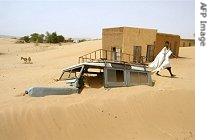2006年VOA标准英语-Experts Ask 'What Now?' for Desertification
搜索关注在线英语听力室公众号:tingroom,领取免费英语资料大礼包。
(单词翻译)
By Phuong Tran
Dakar
27 December 2006
Only days away from the end of the United Nations' Year of Deserts and Desertification, four experts discuss the challenges of translating a decade's worth of research about the degradation1 of land in arid2 areas of the world. Phuong Tran reports from VOA's Dakar bureau, located in the arid Saharan region of West Africa.
 |
| A man walks by a jeep covered by sand in the village of Boumdeid, near Kiffa in Mauritania (2002 file photo) |
David Mouat, the chair of a U.N. group of 25 experts who came together in 2002 to study desertification, said, "The danger of this is that it raises attention, but then we might feel that we have had all these meetings, that we have addressed this issue and can move on to something else and the problem will go away."
Most recently, Mouat and his colleagues met in Algeria last week to review the challenges ahead. One of the main challenges is coordinating3 the different organizations involved in the issue.
Pam Chasek, an editor for the Canadian non-profit International Institute for Sustainable Development, said, "The desertification convention has been hampered4 by the fact that you have got various different ministries5 responsible for different issues that all affect desertification."
"It is hard to break down those barriers between them, to realize that gosh, if you address some of these environmental issues, it will have an impact on development and vice6 versa," she added.
Desertification affects almost half of the earth's surface, home to more than a billion people, says Rattan7 Lal, a professor of soil science at Ohio State University in the United States.
He estimates that about six million hectares of land each year is lost to desertification. He points out that the problem is not only environmental.
"The desert-land degradation issue is a human issue. It is poverty driven. My general feeling is that when pepole are poor, hungry and miserable8, they pass their suffering on to the land," he said. "It is the desperate people who drive the process of land degradation and desertification."
There are several factors that contribute to desertification: Harsh dry climates, for example, can ruin soil. Harmful farming and grazing practices can also deplete9 the soil's nutrients10. Inappropriate irrigation and overgrazing of animals also contribute by decreasing food production.
He says that this problem is most serious in arid regions that also have a level of political and economic instability.
"West Africa is really a tragedy. It is a tragedy of poverty. It is a tragedy of harsh climate, of poor soil," he said. "And above all, resource poor farmers who cannot invest and then the political instability component11. When there is political instability, then the support that farmers need does not exist."
The U.N.'s Mouat says fast action is needed.
"The race to affect the future is the race to make decisions when there is still an opportunity," he said. "We can project changes in landscape and develop very clear, relatively12 simple models that show that the trajectory13 of degradation will have such and such consequences."
"As we wait to make decisions along this trajectory, our opportunities to make a positive impact will become less and less," he continued.
Wafa Essahili is a director of rural development at the Libyan-based non-profit Community of Saharan and Sahelian Countries, which represents 21 African countries. She says the link between desertification and poverty cannot be ignored.
"The convention's recommendations need to be placed at the heart of countries' development plans and poverty reduction strategies," she said. "The fight against desertification cannot take place apart from economic development."
She says farmers can play a key role, if they are provided the tools.
"If we want this evidently poor population to decrease their pressure on the natural resources, we have to create alternative revenue generating activities. It is certain that they are not destroying the land because they want to, but rather because they have no other means," she said.
One idea circulating in the anti-desertification community is carbon credits. Ohio University's Rattan Lal believes that everyone will benefit from this plan.
"To break this vicious cycle, we have to replace the destroyed soil and ecosystem14 by encouraging farmers to adopt recommended agricultural policies," he said.
"If the farmers can restore the carbon soil, the world community pays these farmers for carbon credits, which will offset15 fossil fuel emission16, which mitigates17 climate change. It is a win-win-win situation," he added.
Experts estimate that more than 100 million people are at risk of becoming what they call environmental refugees, or people who are forced to move in search of land that can sustain and feed them.




